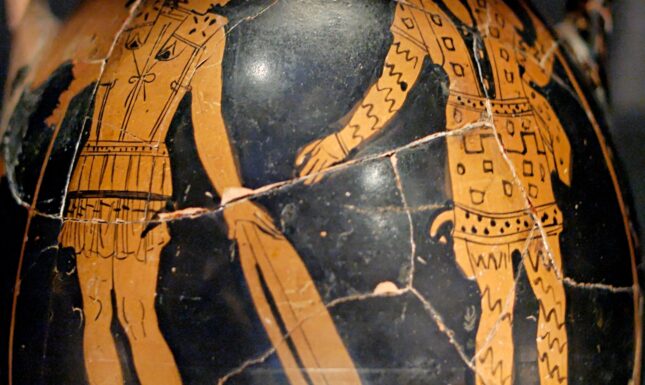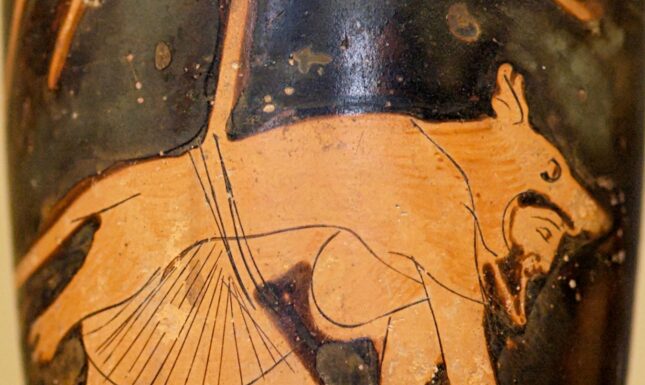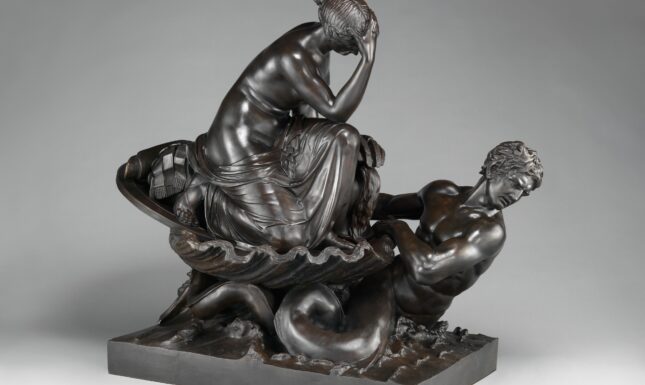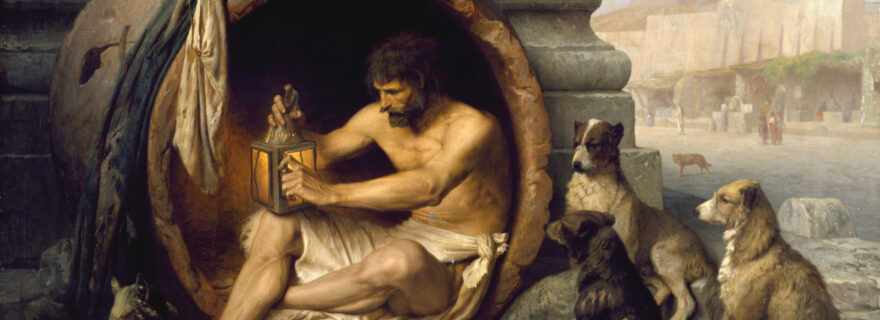It’s all fun and games until Diogenes shows up: wit, Homeric quotations, and death-images in the anecdotes regarding our most favourite Cynic
Can Homeric parody be a means of criticizing society? In this blog post Giorgia Garuti, PhD candidate at the University of Pisa and visiting researcher at LUCAS until last May, explores the function of Homeric quotations in two anecdotes regarding Diogenes of Sinope.
In my PhD project, I am investigating the role of Homeric parody in philosophical literature, which is to say that I am dealing with different literary genres, like dialogues, poems, and anecdotes, somehow linked with philosophers and their teachings, while studying parodic reuses of Homeric hexameters and trying to have fun in the meantime. The Iliad and the Odyssey are by far the most known and cited poems in ancient Greek literature and the perfect candidate for parodies. In fact, for a comical reuse of a model to be successful, the model needs to be recognized by the audience. The epic world of heroes portrayed by Homer was part of everyone’s cultural background and quite often gave way to humorous reinterpretations, such as using Homeric words out of their original context to talk about topics which were far from heroic.
The reason I am including anecdotes in my project is because, as it happens, some personalities are more difficult to grasp than others: for example, no works attributed to the Cynic Diogenes of Sinope (4th century BC) have been preserved, and the only way to understand his philosophical ideas is by taking into consideration a series of very stylised anecdotes in which Diogenes is the main character. While doing research, I found that in many of these anecdotes Diogenes quotes and distorts Homeric verses (most of them from the Iliad) to comment on something he sees or to rebuke someone.
In this blog post I will focus on two anecdotes preserved by Diogenes Laertius (2nd-3rd century AD), who wrote a collection of biographies called The Lives of Eminent Philosophers. As we will see, in both cases beneath the humorous reuse of Homeric texts lies the Cynic criticism of society.
Let us start from the first anecdote (D.L. 6.52, 375-377):
The anecdote is probably set in a public bath (βαλανεῖον), a place where thefts were very common (see also D.L. 6.52, 371-373) and used to make people furious. Diogenes spots a clothes-thief in action, so he decides to ask him two questions: ‘What doest thou here, my good friend? / Or hast thou perhaps come to plunder some corpses?’
The first one (half of one hexameter) recalls a Homeric formula (see Il. 6.123, 15.247 and 24.387: τίς δὲ σύ ἐσσι φέριστε, ‘Who are you, mighty one …’, transl. by Murray 1924) which is normally used by heroes to ask each other’s identity and lineage. With these word-choices, the Cynic begins his rebuke by playfully associating the thief with epic characters.

Diogenes, however, takes his parody a step further. His second question is in fact a verbatim quotation from the 10th book of the Iliad. In this section of the poem, the Trojan fighter Dolon volunteers to spy on the Greek ships during the night. As a reward, he asks Hector for Achilles’ horses and chariot, a request that makes him not only a spy, but a greedy character as well. Dolon is then spotted by Diomedes and Odysseus, on a mission themselves, who ask him whether he is there to spy on the Greeks or rather to strip the corpses of the heroes fallen on the battlefield (ἤ τινα συλήσων νεκύων κατατεθνηώτων, see Il. 10.343 and 387). After that, the two Greeks kill Dolon and go back to their mission.
With this quotation, Diogenes overlaps what he sees happening in front of him with the famous epic episode, thus adding humour to the scene. Most importantly, he creates a parallelism between the Greek heroes (Diomedes and Odysseus) and himself, as well as the despicable Dolon and the clothes-thief. By doing so, he hints at the terrible outcome that awaits the thief. But his moralistic criticism does not spare those who are robbed either. In fact, he addresses them with the word ‘corpses’ (νεκύων κατατεθνηώτων), meaning that they are wasting their lives away in pleasures and futile activities, not embracing the Cynic way of life.

The second anecdote (D.L. 6.53, 384-385) is quite similar to the first one:
The anecdote is probably set in a market, where Diogenes sees a man buying expensive food. The philosopher obviously seizes the opportunity to quote a verse to this big spender: ‘Doomed to a swift death will you be, my child, by what you buy.’ The original hexameter comes from an extremely dramatic scene in the Iliad. In the 18th book Achilles tells his mother he’s finally ready to go back into battle and avenge Patroclus’ death by killing Hector. Thetis warns him (Il. 18.95) that if he does what he says, he’s going to fulfil his destiny and die before the end of the war:

The Cynic does not quote the hexameter as it is but adds a pun to it and changes the verb ἀγορεύεις (‘you say’) into the verb ἀγοράζεις (‘you buy’). With this minimal transformation Diogenes distorts the meaning of the entire verse and adds humour to his rebuke. In fact, the new context is much more prosaic, and the new characters (Diogenes and the big spender) do not share the pathos or the sense of urgency that we find in their epic counterparts. However, I think it is worth noticing once again how the philosopher uses imminent death as a metaphor to depict a life that goes wasted: if the man keeps spending all his money, he will not only eventually run out of it, but he will also spend his entire lifespan chasing luxurious and useless things, while the Cynic philosopher is perfectly content with what he has.
These are just two of the anecdotes included in my project where this recurrent moralistic theme is hidden behind Homeric quotations, thus making the tone of this kind of material not just comical, but serio-comical.
As for now, who knows … maybe next time you consider a spa day, or a trip to the Leiden market, Diogenes’ warnings will come in handy (or maybe not!)
Bibliography and further reading
Gager, J. G. 1992. Curse Tablets and Binding Spells from the Ancient World. New York-Oxford: Oxford University Press.
Hard, R. 2012. Diogenes the Cynic. Sayings and Anecdotes. With Other Popular Moralists. New York: Oxford University Press.
Murray, A. T. 1924-1925. Homer. The Iliad. London-Cambridge (MA): Harvard University Press.
Bonandini, A. 2014. “Tessere omeriche nella tradizione diatribica e menippea.” In Sparsa colligere et integrare lacerata. Centoni, Pastiches e la tradizione greco-latina del reimpiego testuale, edited by Maria Teresa Galli and Gabriella Moretti, 133-180. “Labirinti”, 155. Trento: Università degli Studi di Trento, Dipartimento di Lettere e Filosofia.
Teufer, T. 1890. De Homero in apophtegmatis usurpato. Lipsiae: Typis O. Brandstetteri.



0 Comments